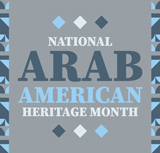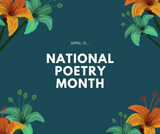Author Shann Ray of Spokane, WA interviewed Butte, MT author David Abrams about Abrams’ second novel, Brave Deeds.
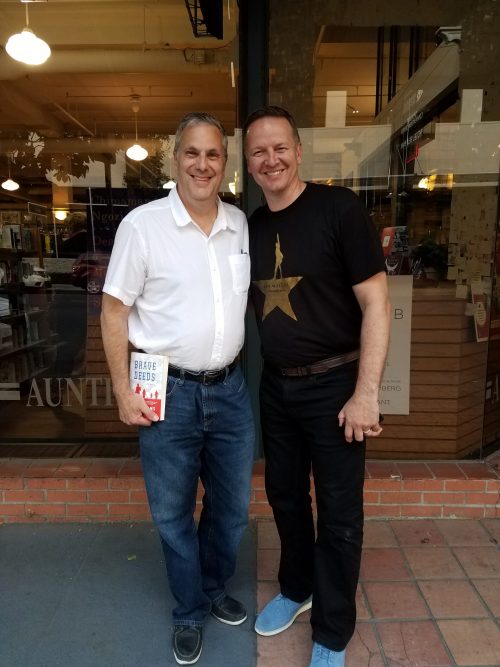
David Abrams (L) and Shann Ray
Shann Ray: Your work is powerful, visceral, and moves readers to consider the heart of flawed characters. In so doing we consider our own flaws, and it makes us more humble if we open that door. What’s the secret to creating characters who make us see ourselves more truthfully, more humbly, and with greater compassion?
David Abrams: I think you pegged it when you brought up that word “flaws.” Going behind the flag-waving, hooah-hero facade we often erect in front of our military men and women was key for me in writing Brave Deeds. As someone who served twenty years in the military, I know all too well that those heroic, media-friendly facades can be as false as the towering false fronts on Main Street in old western towns. Those storefronts gave the illusion of two- and three-story buildings, but go around to the back alley and you found they were only one-story shops after all.
In much the same way, we build our military heroes to impossible heights. This is a disservice to those individuals, as well as the public at large. If we only think of soldiers as clean-cut, fierce warriors to be used as props at NFL halftime shows (see the great Billy Lynn’s Long Halftime Walk by Ben Fountain for the classic example of this), then we don’t see them as “real people.” And, of course, the vast ranks of uniforms in our military are filled with nothing but real people.
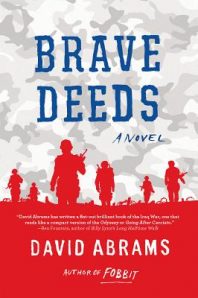 I didn’t consciously set out to bust military myths in Brave Deeds, but as I started writing about the six soldiers walking across Baghdad, their true selves started coming out. I discovered they were adulterers, murderers, overeaters, and porn addicts. At one point, I explored their backstories to fully flesh them out, putting it all into one chapter called “Flaws.” I later decided to break it up and scatter those “flawed men” chapters throughout the book, slowly revealing the faces behind the masks to readers. By looking at the dark side of Arrow, Fish, Park, Drew, Olijandro, and Cheever, I myself started to have more compassion for them.
I didn’t consciously set out to bust military myths in Brave Deeds, but as I started writing about the six soldiers walking across Baghdad, their true selves started coming out. I discovered they were adulterers, murderers, overeaters, and porn addicts. At one point, I explored their backstories to fully flesh them out, putting it all into one chapter called “Flaws.” I later decided to break it up and scatter those “flawed men” chapters throughout the book, slowly revealing the faces behind the masks to readers. By looking at the dark side of Arrow, Fish, Park, Drew, Olijandro, and Cheever, I myself started to have more compassion for them.
SR: What was your childhood dream of what you might become as a man? How, when, and why did a career as an author enter into your dreams?
DA: When I was in junior high, I got hooked on the James Herriot books (All Things Wise and Wonderful, All Creatures Great and Small, etc.) and I was convinced I was going to be a veterinarian. Prior to Herriot, I’d devoured the Jim Kjelgaard novels (Big Red, Irish Red, etc.)–an author for whom I think you and I both share a fondness–and so I was primed to be the next Doctor 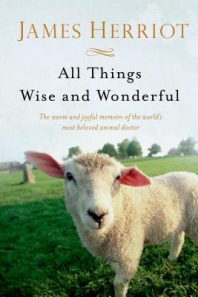 Doolittle. My veterinarian dreams withered when I learned that you needed to take a lot of math and science courses in college. My grades in my junior high math classes were so bad I had to count on my fingers and toes during exams. For some reason, my teacher objected to me taking off my shoes and socks in the middle of class.
Doolittle. My veterinarian dreams withered when I learned that you needed to take a lot of math and science courses in college. My grades in my junior high math classes were so bad I had to count on my fingers and toes during exams. For some reason, my teacher objected to me taking off my shoes and socks in the middle of class.
Lucky for me, I was already deeply, deeply in love with language, both as a voracious reader and a dabbling young writer. I’d been writing stories since early elementary school and had been encouraged along the way by a few kind, compassionate teachers (hello, Mrs. Schlinger!). My first nationally-published piece of writing was in Jack and Jill magazine in 1975 when I was in fifth grade. It was, predictably, a short how-to piece called “Caring for Your Dog.” I was over the moon, and on my way to being a “famous writer.” Or so I told myself at the time.
SR: What does love have to do with war and what does war have to do with love?
DA: This is an interesting, and difficult-to-answer, question. I don’t know if I have a good answer except to say that both love and war are indelible experiences of the soul. You will not walk away from either unchanged.
SR: There is a sense of brotherhood to your work, distilled, sent through the crucible. What has been your own experience of brotherhood in your personal life, in the books that have most shaped you, and in your writing?
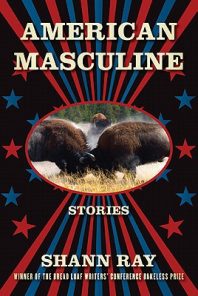 DA: I don’t want to embarrass you too much, Shann, but when I think of a brother-writer, I think of you. Our friendship has been a relatively short one, starting right around the time American Masculine came into the world, but I hope you’ll agree it has been a deep and bright one. You are truly a kind and generous soul and I’ve been privileged to call you “brother.” I’ll never forget the night you called me to say that you had just, moments earlier, sold American Copper. I was so touched by the fact you couldn’t wait to tell me. And of course, I was leaping for joy right along with you. Your work is powerful, powerful, powerful and I think both of those two American books have been recent strong influences in my own writing.
DA: I don’t want to embarrass you too much, Shann, but when I think of a brother-writer, I think of you. Our friendship has been a relatively short one, starting right around the time American Masculine came into the world, but I hope you’ll agree it has been a deep and bright one. You are truly a kind and generous soul and I’ve been privileged to call you “brother.” I’ll never forget the night you called me to say that you had just, moments earlier, sold American Copper. I was so touched by the fact you couldn’t wait to tell me. And of course, I was leaping for joy right along with you. Your work is powerful, powerful, powerful and I think both of those two American books have been recent strong influences in my own writing.
In a little wider sense, I have found via social media a solid community of writers and book people: editors, publicists, and– mostly especially– booksellers. I’ve made many wonderful connections in our small-ish writing tribe on Twitter and Facebook. Little by little, over the years, I’m trying to meet as many “Facefriends” in real life as possible. I can’t tell you what a joy it is to go to book festivals and conferences and say to them, “It’s great to finally meet you!”
SR: Thanks for your kindness David. Yes, it has been a friendship that is truly deep and bright, a brotherhood I’ve cherished, and will always cherish. So happy to see your books making their illumined way in the world!
Tell us a few of your favorite independent bookstores. Why do you love them and the booksellers who inhabit these architectural and personal treasures of our national consciousness called independent bookstores?
DA: Oh gosh, picking a favorite bookseller is like asking Sophie to make a choice. Of course, there are my own beloved Montana booksellers Ariana at Country Bookshelf in Bozeman, Jo at Books & Books in Butte, Marc and Andrea at Elk River Books in Livingston, and Mara (and the recently retired Barbara) at Fact and Fiction in Missoula. I love them all, and they know that. So let me just highlight a few others beyond the Treasure State….
I just got done with a driving tour to promote Brave Deeds throughout the Pacific Northwest (3,860 miles in 10 days), and it gave me the chance to stop by some new bookstores I missed on my Fobbit travels five years ago: Sunriver Books in Oregon, Eagle Harbor Books in Washington, and BookPeople of Moscow in Idaho. Every one of them goes out of their way to treat authors like rock stars. They are passionate about selling books and their stores are the closest things to literary churches I’ve ever seen. Even now, I’m getting a little weepy when I think of how each one of them wrapped their arms around this weary traveler and his wife as we pulled into town in our dusty Jeep Grand Cherokee. And their dedication to the written word was more than evident in the equally-passionate readers who turned out to hear me read from the novel. My visit to Eagle Harbor Books on Bainbridge Island was a spur-of-the-moment drop-in visit to sign stock, but my parting words to Victoria, the events manager, were: “I promise I’ll be back soon.”
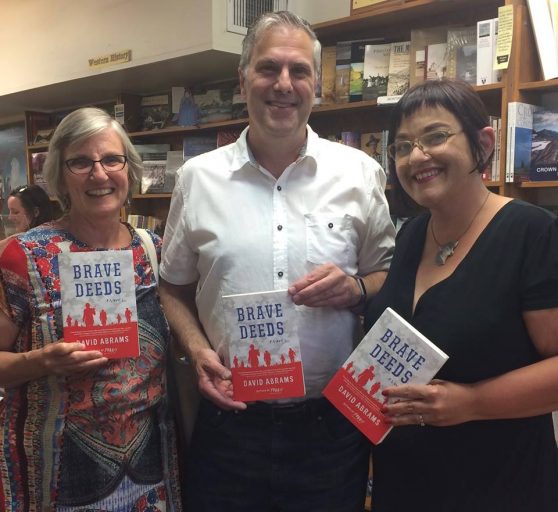
David Abrams (center) with Barbara Theroux and Mara Panich-Crouch of Fact & Fiction at the “Brave Deeds” launch.
David Abrams will be in public conversation with Lee Child at a ticketed event sponsored by Fact & Fiction in Missoula on November 8. Click here to purchase tickets. Abrams also has national appearances planned.

